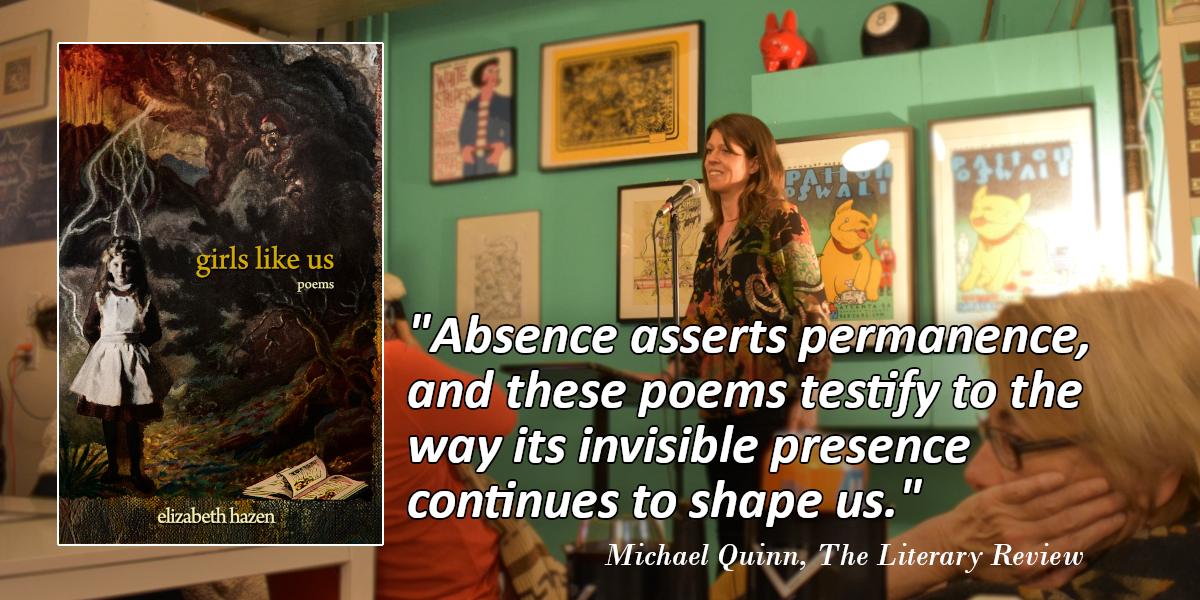TLR Delivers a Stellar Review of GIRLS LIKE US
Michael Quinn of TLR traces the arc of Elizabeth Hazen's new collection "The Last Girl" and discovers the ways in which "Absence asserts permanence."

A new review this week from The Literary Review traces the arc of Elizabeth Hazen's Girls Like Us from a "[focus] primarily on the self, [to] poems [that] are gradually consumed by a responsibility to others, primarily through motherhood and its all-consuming need to provide for and protect."
Motherhood, womanhood, girlhood, addiction, and identity all present themselves in different ways throughout this arc, and Brooklyn-based reviewer Michael Quinn deals deftly with each of them, analyzing bits and pieces of many poems which tell the story of Girls Like Us rather than lingering too long on one or two images. In doing so, Quinn is able to depict Girls Like Us as a book that refuses pigeon-holing and which dares to be complicated and often difficult.
This dedication is evident in Quinn's description of the cover of the collection, a collage by Lindsay Fleming, "Near the girl’s feet, a book lies on the ground with its pages blown open. An adventure awaits: dangerous, scary, exciting, confusing." And, in a more detailed way, it is evident in Quinn's short but revealing analyses of the Hazen's Diagnosis cycle:
'“Diagnosis I,” “Diagnosis II,” and “Diagnosis III” respectively depict three scenes. In the first, an unwell woman is assured by her male doctor that despite her undiagnosed source of pain, there’s nothing wrong with her. In the second, a young virgin’s group of male tormentors becomes her booze-supplying seducers. In the third, the past of a woman at midlife is thrown into relief when a drunk aggressively hits on her. “Girls like / you, he repeated, leaving me / a blank to fill.”'
Featured Audio: “Letter from Sligo Creek” a poem by Rose Solari
Like the cover photo, the poems in Difficult Weather are timeless and—unlike the poems in many first books—extraordinarily mature. Although the narrative voice is generally that of a young woman in her late twenties and early thirties whose subject matter sometimes ranges back to early childhood, these are poems of adulthood: the discovery and endlessly painful rediscovery of human frailty, sexual and emotional betrayal, bad love in all its familial and romantic varieties, memory, and elegy…
Listen to Grace Cavalieri Interview fmr. Poet Laureate Robert Pinsky
Grace Cavalieri is known widely for her stirring and empathic poetry, collected in her Legacy work Other Voices, Other Lives, but did you know that she is also an impressive interviewer? On her NPR show, The Poet and The Poem, she interviews significant poets from the US and around the world, with an aim of interpreting their lives through their poetry. In her tenure on the program, she has interviewed 9 US Poets Laureate (you can find a list with these archived interviews HERE), including the incomparable Robert Pinsky.
Featured Poetry: “Toytown” by Grace Cavalieri
The name Other Voices, Other Lives, is not purely poetical, in fact, for Grace Cavalieri it is a mission statement. In her Legacy Book of the same name there are several sections in 3rd person omnipotent which aim to breathe the same air as famous women who have suffered adversity. Tragic figure Anna Nicole Smith, feminist writer Mary Wollstonecraft, Cora from William Carlos William’s Kora in Hell. All in all they are an admix of Grace Cavalieri’s poetic life, all brought together in one beautiful volume; so, perhaps, we might figure that Anna Nicole Smith converses with Mary Wollstonecraft for the very first time in the pages of Other Voices, Other Lives.
Today, from the Anna section we have the heart-rending “Toytown”
